BREASTFEEDING
Breastmilk is the most precious gift a mother can give her baby, providing nutrients necessary for healthy growth and antibodies that protect your baby from disease. The time spent breastfeeding also helps to foster a stronger bond with your baby.
The benefits are so great, that Health Professionals recommend that your baby should be fed exclusively breastmilk from birth to six months, and then that breastmilk be given in addition to solid foods until at least 12 months.
Breastfeeding is such an important part of the amazing journey of motherhood..
BREASTMILK STORAGE GUIDELINES
Breastmilk
1) Freshly expressed into a closed container
2) Previously frozen – thawed in refrigerator and not warmed
3) Thawed outside refrigerator in warm water
4) Infant has begun feeding
Room Temperature
1) 6-8 hours (26oC or lower).If refrigeration is available, store milk there.
2) 4 hours or less (ie the next feed)
3) For completion of feed
4) Only for the completion of the feed, then discard
Refrigerator
1) No more than 72 hours. Store in the back, where it is coldest
2) Store in refrigerator 24 hours
3) Hold for 4 hours or until next feed
4) Discard
Freezer
1) 2 weeks in freezer compartment inside refrigerator (-15 oC)3 months in freezer section of refrigerator with separate door (-18 oC)6 – 12 months in deep freeze (-20 oC)*
2) Do not refreeze
3) Do not refreeze
4) Discard
CHANGES DURING PREGNANCY
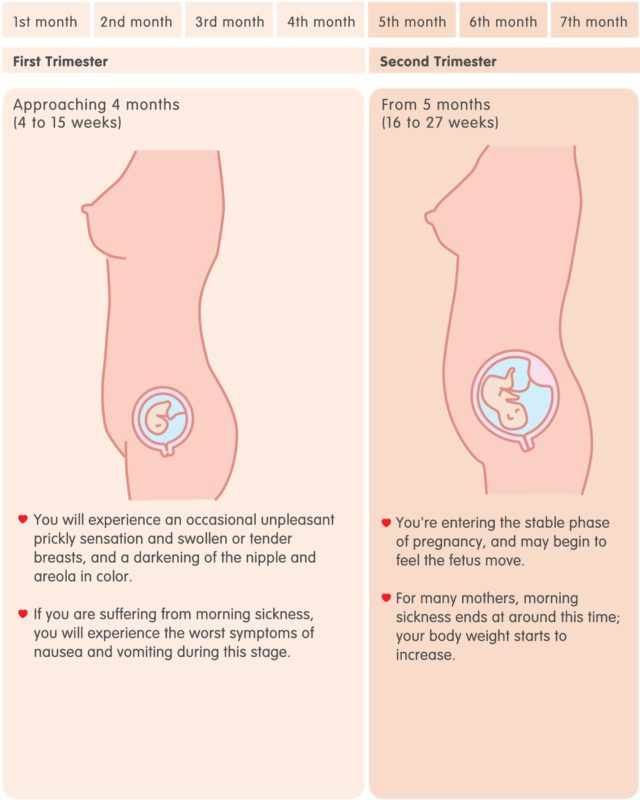
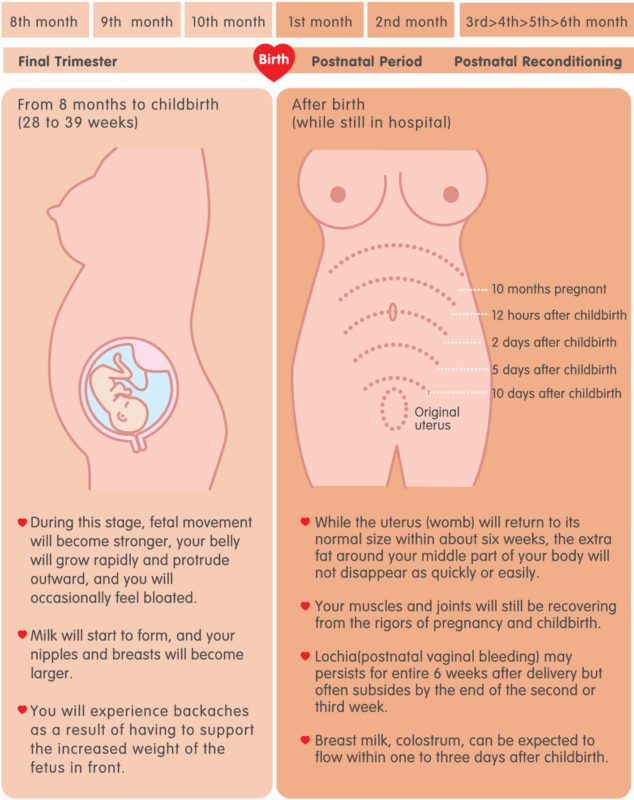
FROM CONCEPTION TO BIRTH
1st MONTH (0 – 3 Weeks)
Your Body :
Development during pregnancy is usually expressed in weeks. From the first day of your last menstrual period prior to conception to the sixth day following that is considered to be “week 0”; from the 7th day is counted as week 1 and so on. For this reason, the time prior to conception is included in the week count.
For Your Information :
Ovulation occurs about two weeks after a menstrual period. When the egg cell is fertilized during this stage and subsequently imbeds itself in the wall of the uterus, pregnancy is considered to have begun. There is no change in the size of the uterus at this time.
Your Baby :
Continuous cell division of the fertilized egg takes place at a raped rate, and at 8 weeks the embryo becomes a fetus.

2nd MONTH (4 – 7 Weeks)
Your Body :
This is when many women “miss” their periods, and consequently realize that they are pregnant. Your basal temperature will be high for a while, and this can cause feverishness and weakness similar to those you experience when you have a cold. Due to changes in hormones, darkening of the areola and swelling of the breasts may also occur.
For Your Information :
The uterus becomes larger and you will sometimes experience discomfort in the lower abdomen and back. Some mothers will start having morning sickness.
Your Baby :
The fetus is now about 2 cm long. Its heart has formed and a heartbeat can be confirmed..
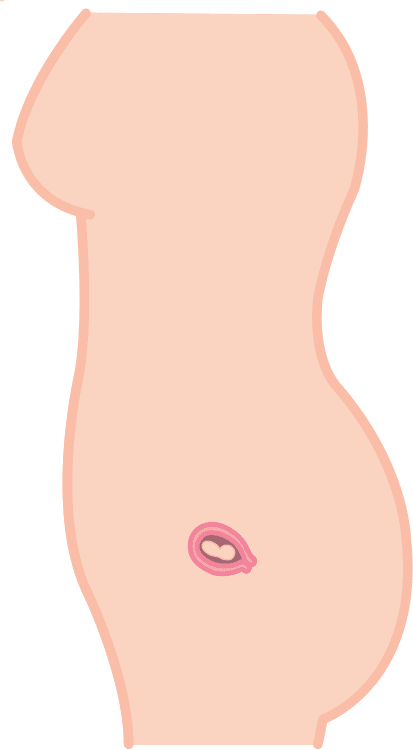
3rd MONTH (8 – 11 Weeks)
Your Body :
The uterus is now about the size of a clenched fist. The number of women suffering from morning sickness will increase and symotoms will be strongest at around 10th or 11th week, but most women will overcome it by the 15th week or so.
For Your Information :
Due to pressure on the bladder caused by the increasing size of the uterus, you will have to go to the bathroom more often. Your breasts and lower abdomen will become taut. Vaginal discharge will also increase Up until this time, there is a greater risk of miscarriage, so strenuous sports or exercise should be avoided.
Your Baby :
The fetus is now 8 cm long and weighs around 20 g. The head body, arms and legs are beginning to form. Movement will begin after 8 weeks and at around 11 weeks the heartbeat can be heard with a stethoscope.
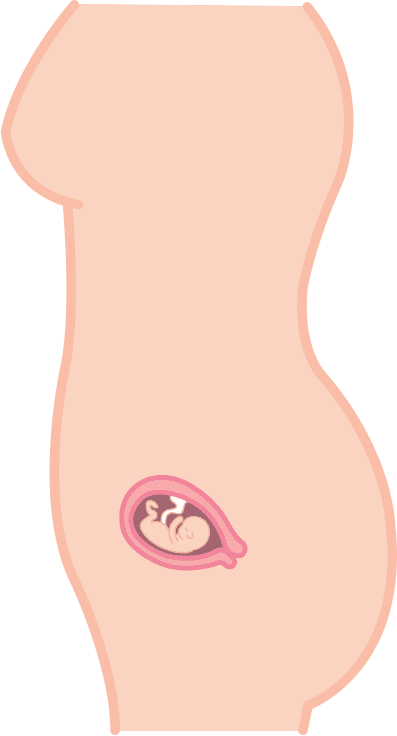
4rth MONTH (12 – 15 Weeks)
Your Body :
For most women, morning sickness will have subsided and appetite will be restored. The increased size of the abdomen will start becoming noticeable externally and the enlarged uterus may cause pain or cramps in the upper leg joints.
For Your Information :
After 14 weeks the placenta has almost completely formed and the possibility of miscarriage is greatly reduced.
Your Baby :
The weight of the fetus is now about 100 g and it is about 15 cm long. the internal organs have begun to develop, and arms and legs have formed. Bone and muscle have begun to develop and the fetus can move around freely in the amniotic fluid. Brain develpoment is rapid, with the cerebrum and cerebellum forming at this time.
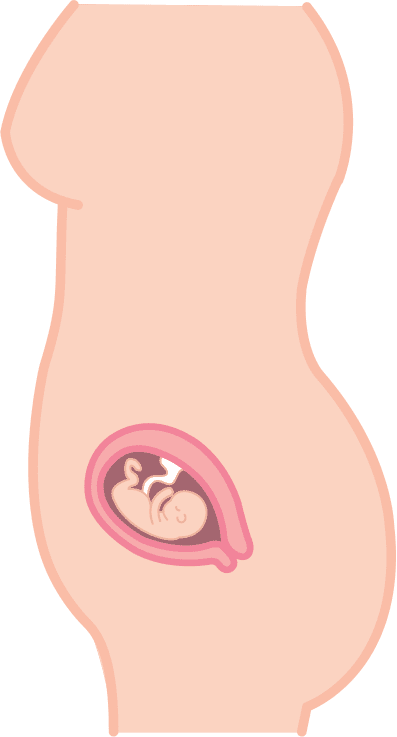
5th MONTH (16 – 19 Weeks)
Your Body :
A stage of stable pregnancy is entered. The baby start taking nurishment and oxygen form the placenta via the umbilical cord.the uterus now protrudes as for as the navel making the pregnancy more conspicuous.
For Your Information :
The breasts develop and grow large. At about 18 Weeks some mothers begun to feel fetal movement.
Your Baby :
The body is now about 25 cm long.heart and lungs are working well and the baby’s heartbeat can be heard with a stethoscope. the shape of the ears, nose and mouth become defined and finger and toe nails and hair begin to grow.

6th MONTH (20 – 23 Weeks)
Your Body :
Development of the fetus clearly protrudes forward and most mother can feel the baby moving. During pregnancy, the amount of blood increase, and pressure on the heart and lungs by the enlarged uterus make you susceptible to heart palpitations (rapid heartbeats) and shortness of breath. As the abdomen is now a considerable weight, care must be taken to avoid backache.
For Your Information :
Some expectant mothers experience a discharge of colostrum (yellowish pre-milk) from the breasts. This is about the right time to consider begining nipple massage.
Your Baby :
The baby is now about 30 cm long and weight about 500 g. Eyebrows and eyelashes have developed and the body can open its eyes.

7th MONTH (24 – 27 Weeks)
Your Body :
Significant protrusion accurs as growth of the uterus proceeds as for as the region above the navel. Estrogenic hormone levels rise, and when tired, you can easily feel how taut the skin on you abdomen has become. the increased load on the lower and middle of the back causes pain. in addition, other problems begin to accur, such as constipation or hemorhoids.
For Your Information :
Fetal movement becomes stronger and more frequent. if you dont feel any movement a all for a full day, a visit ti the doctor is advisable.
Your Baby :
At 26 Weeks the baby is around 25 cm and has reached around 800 g.Eyes and ears begin functioning and the baby starts becoming sensitive to light and sound. The baby also becomes capable of fine movements such as changing its position and opening and clenching its hands.

8th MONTH (28 – 31 Weeks)
Your Body :
This is when fetal movements are at the strongest during this period, even to the extent of causing discomfort or pain. at the same time fat increases to protect the abdomen, which can easily lead to stretch marks.For Your InformationYour arms and legs will often swell. if this is only temporary occurrence, for example late in the day, this is natural. However, if the swelling persists throughout the day, if could be a sign of pregnancy toxicity (pre-eclampsia or eclampsia), so a visit to the doctor is strongly recommended.
Your Body :
At 30 weeks, the baby is about 40 cm long and weight about 1500 g and starts to take its final position in the uterus. the baby starts to create fatty tissue under the skin. At this time, you would probably know the sex of the baby using ultrasound.
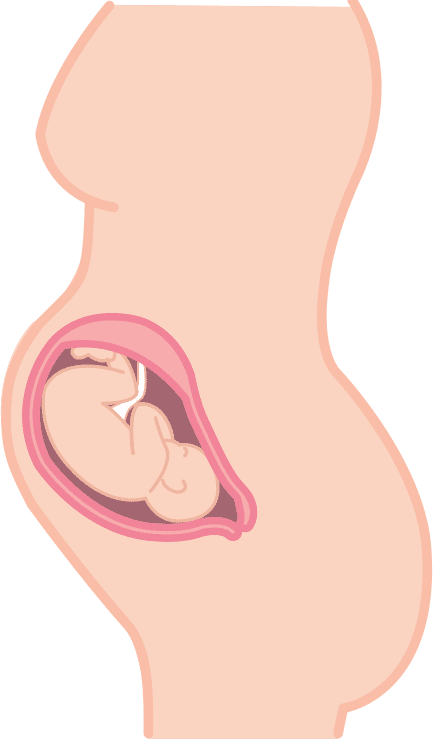
9th MONTH (32 – 35 Weeks)
Your Body :
Now, is the base of the uterus extends down to the oit of the stomach, you may experience heartburn and indigestion. As the heart and lungs are also under pressure, breathlessness and palpitations (rapid heartbeats) are a frequently occurrence.
Your Information :
Incontinence and the need to urinate frequently are the result of the baby’s head pressing on you bladder. it is a good idea to change your underwear frequently so as to avoid the risk of cystitis. When walking, you might feel some pain in your upper leg joints and pubic bone. this is because the baby’s head has now reached the pelvic bone -a proof that childbirth is drawing near.
Your Baby :
At 34 weeks, the baby is about 45 cm long and weight about 2200 g.The baby can now drink from the amniotic fluid and discharge urine.the baby can also experience pleasure or displeasure in response to external influences.

10th MONTH (36 – 39 Weeks)
Your Body :
The baby has moved down into the pelvis and abdominal expansion because very pronounced. some women experience temporary navel protrusion during this period. pain in the upper leg joints and pubic bone become more intense.
Your Information :
As childbirth approaches, the vagina and opening to the uterus relax and vaginal discharge increases. Several Times a day the abdomen will feel tight and swollen and there will be some pain. some women begin to experience something similar to labor pains, know a prelabor labor
Your Baby :
At 39 Weeks, baby’s weight is around 3000 g and length about 50 cm. The muscles around the mouth have developed sufficiently to enable the baby to breastfeed. By this stage, the baby is ready to be born at any time.

TQUESTION & ANSWER
Question : My hair is falling out !.
Answer : Because of the hormonal imbalances during pregnancy, the hair on your head may fall out, while the hair on your body could grow thicker. there is no need to worry-this is trmporary, and will only last until your period returns after your baby is born. Eat well-balanced meals containing such foods as green vegetables or seaweed. Alos carefully wash your hair using a mild shampoo.
Question : My hair is falling out !.
Answer : Because of the hormonal imbalances during pregnancy, the hair on your head may fall out, while the hair on your body could grow thicker. there is no need to worry-this is trmporary, and will only last until your period returns after your baby is born. Eat well-balanced meals containing such foods as green vegetables or seaweed. Alos carefully wash your hair using a mild shampoo.
Question : I have Gained weight and worried about pregnancy-related problems due to excessive weight gain (toxemia), how can i prevent this ?
Answer : Toxemia is a pregnancy-induced hypertension where a pregnant mother experiences a group of three or more symptoms. the signs and symptoms of toxemia may include hands, sudden weight gain a well as protein in urine. If you are experiencing any 2 of the aboue symptoms. You may possibly suffer from toxemia. should this happen, please consult your gynecologist immediately.The most important things to prevent toxemia is to control your weight from mid to final trimester of pregnancy, your appetitemay increase. processed food, fast food, high calorie and low nutrition food are highly not recommended. the weight gained during this period should not be more then 500g per week.you may control your weight by doing some exercises such as walking for at least 30 minutes a day. If you are fit enough, you may even do the usual household chores. However, do consult your gynecologist before attempting to do any exercises or heavy household chores.
Question : I’ve heard the first trimester is when the fetus is most susceptible to the effects of medicine. What kind of effects are there ?
Answer : You need to be praticularly careful from the 4th week of pregnancy to the end of the 7th week, as your baby’s vital organs are forming at this time. When you get a prescription at a hospital, be absolutely sure to let them know you are pregnant. Be careful to take the medicine in the dosage in which it is prescribed, and by the method ordered also, avoid using in great quantities sedatives containing aspirin are any over-the-counter drugs you have purchased at a pharmacy. Before taking any medicine during this part of your pregnancy, please consult you obstrician.
